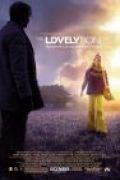
Directed by
Peter Jackson
135 minutes
Rated MA
Reviewed by
Andrew Lee

The Lovely Bones
Synopsis: Susie Salmon (Saorise Ronan) is dead, murdered by a local serial killer. From her own private heaven she tells the story of her life, and that of her family, both before and after her death.
It's sad that a film about a dead girl narrating her life should be so lacking in soul, but such is the way of Peter Jackson's misadventure in the metaphysical. It's not that elemental fantasy and the lives of young girls are outside his ability, his 1994 film, Heavenly Creatures demonstrated that he's got the skill and sensibility to deliver on the promise of the material, but this time he has missed the mark.
Alice Sebold’s source novel has been highly praised but something has gone missing in the transition from page to screen. Whatever it was that touched readers profoundly has been cut out of this empty stylistic exercise. The actors are talented and do their best, but they struggle to bring to life roles that are but rough sketches of people. Susan Sarandon's alcoholic grandmother and Rachel Weisz's grieving mother, Abigail, are nothing but faces. They have nothing to work with, nothing to allow any kind of depth of character or sympathy for them. Abigail's sudden abandonment of her family to escape her grief at Susie's death would seem to be an interesting storyline, but instead it's just a few lines of voice-over. The problem seems to be that it's Susie narrating a montage of events, rather than a story in which events unfold and allow for some kind of emotional engagement. We're as removed from events as Susie, and unlike her, have no investment in the outcome of any of them. Only Mark Wahlberg’s grieving father and Stanley Tucci’s malevolent killer evoke any real emotion. Tucci in particular is effective, but he’s still just a clever monster rather than a fully-fledged person. Wahlberg is perhaps the worst served by the film, as he comes close to having real depth, generating a great deal of sympathy as his grief morphs into a paranoid obsession, only to be cut short.
There are a number of effective sequences in the film, a tense thriller moment as Susie's sister rummages through the murderer's house, a beautifully awkward moment as Susie flirts uncertainly with a boy, but they are just moments, and more interesting as exercises in cinematic technique than anything deeper. I'm curious to know if the book is just as devoid of narrative impulse. There is an argument that a gestalt of beautifully observed moments can coalesce into some kind of transcendent experience, and the best of arthouse cinema demonstrates this. Meditations on life can be fascinating, but it's like catching lightning in a bottle, and The Lovely Bones fails in this regard. It's lazily written, with a voice-over trying to string everything together. But nothing connects, nothing resonates, and even its final moments, which have the feel of reaching towards some kind of deeper meaning, utterly fail. It feels like the most attention went into creating the sub-Gilliam visuals of Susie's heaven, the rest of the story being an annoying adjunct to justify them.
The Lovely Bones is pretty, but devoid of anything approaching emotional resonance or depth. Like a date with some lovely bones, it's an exercise in frustration.

Want more about this film?


Want something different?




